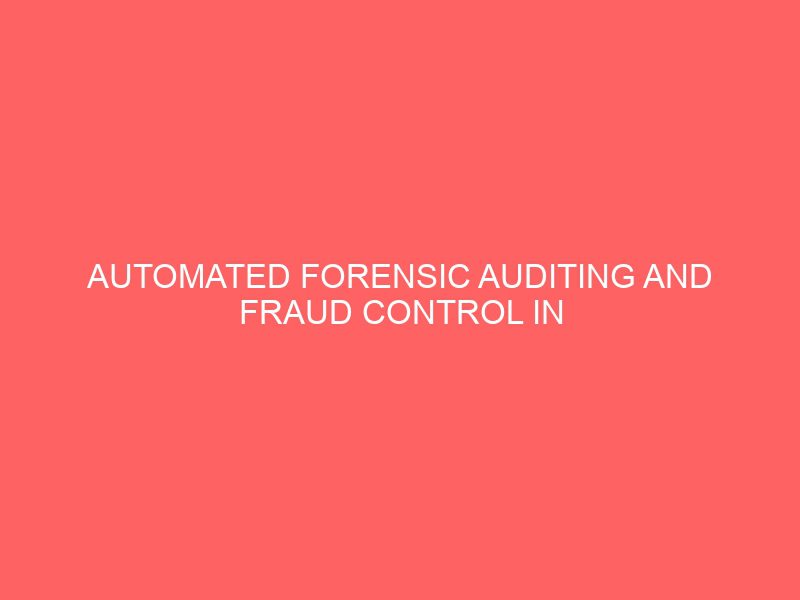AUTOMATED FORENSIC AUDITING AND FRAUD CONTROL IN NIGERIA (A CASE STUDY OF THE ECONOMIC AND FINANCIAL CRIMES COMMISSION)
ABSTRACT
The topic Automated forensic auditing and fraud control in Nigeria is a critical concept in modern days accounting, and our country Nigeria is not left out in its practice. This research aims at pointing out the rationale behind fraudulent practices as well as examining the role of automated forensic auditing on fraud control. A survey research design was adopted for this research study and the sample size was selected using Taro Yamane sampling technique as data used were obtained from both primary and secondary sources. Four research questions were formulated out of which three hypotheses were tested using the ANOVA statistical technique. From the analysis, the major findings derived were that; Automated forensic auditing has significant relationship with fraud control as it helps in the detection and prevention of fraud; There are measures employed to solve the problems of insufficient documented materials necessary for investigating suspects as it helps to foster investigative process; There are standards set for improving on techniques used for obtaining evidence. Conclusively, it can be said that fraud control in Nigeria cannot do without forensic accounting; fraud detection may not be possible in Nigeria if management of different levels are not committed to do an indebt study of a financial statement i.e. having a physical check of assets and liabilities. It was recommended that; The internal control system of every organizations should be strengthened through regular audit; training of forensic auditors should be done regularly, and also seminars should be organized to encourage the use of automated tools.
CHAPTER ONE
1.0 INTRODUCTION
Mobile wise geek 2011 defined fraud as a deliberate misrepresentation that causes a form of monetary losses. All of these are usually required for an act to be considered fraud, if someone lied about his name.
United states legal 2011, defined fraud an international misrepresentation of material existing facts made by one person to another with the knowledge of its falsity and for the purpose of inducing the other person to act, and upon which the other person relies with resulting injuries or damages.
Fraud has been in existence from the beginning of creation, and the increase of fraud on daily basis brought about forensic auditing.
Forensic auditing is defined as the activity that consist of gathering, verifying, processing, analyzing of and reporting of data in order to obtain facts and /or evidence in the area of legal of financial disputes and or irregularities including fraud and giving preventative advice. IFA 2011.
Fraud is an independent criminal offence, and it is the main phenomenon that gave birth to forensic auditing, especially those related to economic crime. These economic crimes are known to be an unpleasant fact and a disheartening issue in the heart of many organizations, and the control of it, is a concern for any organization that employs employees, accountants or other hired professional that have access to the organizations income, receipts or funds.
Therefore, we are faced with the inescapable conclusion that forensic auditors are charged with the responsibility of controlling and preventing those fraudulent practices.
1.1 BACKGROUND OF THE STUDY
Brief History of Economic and Financial Crime Commission EFCC
The Economic and Financial Crime Commission EFCC has grown to a robust and reputable national institution that now commands respect. They have gained the admiration of Nigerians and tge international community as a whole as the most vibrant anticorruption fighting organization that has fought corruption to a standstill within the short time of its existence.
Over the years, Nigeria suffered tremendously in her economy in the hands of corrupt leaders who for selfish reasons reduced a country like Nigeria which is rich in oil to one of the poorest countries in the world. All these brought about the establishment of EFCC.
i. Formation of the Economic and Financial Crime Commission EFCC
The Economic and Financial Crime Commission EFCC was established in 2003 by the Economic and Financial Crimes Commission Act 2002, and reenacted in 2004 by the Act as a body corporate with perpetual succession and common seal. It has its headquarter at No 5 Fomella Street, Off Crescent, Wuse 11, Abuja. With Nuhu Ribadu as the first executive chairman until 2008 he was replaced by Fomida Waziri, and Mr. Ibrahim Lamorde was appointed the chairman of the commission on 15th February 2012 and he is still the substantive chairman till date.
Its establishment was partially in response to pressure from the financial task force on money laundering FATF, which named Nigeria as one of the 23 countries noncorporative in international communities effort to fight money laundering.
ii. Vision statement: To make Nigeria a safe and corrupt free business environment for sound health and positive image of the country.
iii. Mission statement: The mission statement of the commission includes;
a. To curb the menace of corruption that constitutes the cog in the wheel of progress of Nigerians.
b. To protect national and foreign investments in the country.
c. To imbibe the spirit of hard work in the citizenry and discourage illgotten wealth.
d. To identify illegally acquired wealth and confiscate it.
e. To build an upright workforce in both public and private sector of the economy.
f. To contribute to the global war against financial crimes and terrorism financing in Nigeria.
1.2 STATEMENT OF THE PROBLEM
In this study, there are certain problems that are related to the application of forensic auditing and the include;
1. Insufficient skilled manpower for the use of automated tools or software.
2. Insufficient documented materials for investigating suspects.
3. Inadequate techniques for obtaining evidence.
4. High cost of analysis.
Original price was: ₦3,200.00.₦3,000.00Current price is: ₦3,000.00.








Reviews
There are no reviews yet.